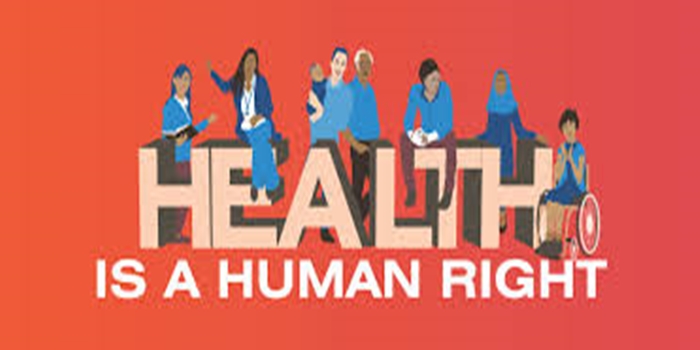Introduction
Healthcare is essential for human dignity, well-being, and a productive life, with a lack of access leading to preventable suffering and broader negative impacts on families, communities, and economies. Many international framework’s views access to healthcare as a fundamental human right.
Understanding the Right to Healthcare:
The right to healthcare is a fundamental human right, meaning everyone is entitled to the highest attainable standard of physical and mental health. This right encompasses access to quality healthcare services, as well as addressing the underlying factors that impact health, such as access to clean water, sanitation, and food. It’s not just about access to hospitals, but also about ensuring a healthy environment and addressing social determinants of health.
Features of the Right to Healthcare:
Accessibility:
Healthcare services should be geographically, economically, and culturally accessible to all. This means they should be within reasonable reach, affordable, and culturally appropriate.
Availability:
There must be sufficient healthcare facilities, staff, and supplies to meet the needs of the population.
Acceptability:
Healthcare services must be respectful of cultural norms and preferences, and sensitive to the needs of all individuals, including those from marginalized groups.
Quality:
Healthcare services must be of good quality, meaning they are safe, effective, and evidence-based.
Accountability:
There should be mechanisms in place to ensure that healthcare providers and institutions are held accountable for the quality and delivery of care.
Non-discrimination:
Healthcare services should be provided without discrimination on any basis, including race, ethnicity, gender, religion, or socioeconomic status.
Informed Consent:
Individuals have the right to make informed decisions about their own health and treatment.
The right to health is indivisible from other human rights:
The right to health is closely linked to other human rights, such as the rights to education, food, housing, work, and information. For example, access to education can improve health literacy, while adequate housing can reduce the risk of disease.
Realizing the right to health requires a multi-faceted approach:
Strengthening health systems:
This includes investing in infrastructure, training healthcare professionals, and improving the management of healthcare services.
Addressing social determinants of health:
This involves tackling poverty, inequality, and other factors that contribute to poor health.
Promoting public health:
This includes implementing preventative measures, such as vaccination campaigns and health education programs.
Ensuring access to essential medicines and technologies:
This is crucial for treating illness and improving health outcomes.
Empowering individuals and communities:
This involves ensuring that people have the knowledge and resources to make informed decisions about their health.
Healthcare as a Human Right Matters:
Health is a prerequisite for other rights:
Good health enables individuals to pursue education, employment, and participate fully in society.
Reduces health disparities:
Recognizing healthcare as a right helps address inequalities and ensure that everyone, regardless of their background or socioeconomic status, has access to the care they need.
Promotes social and economic development:
Healthy populations are more productive and contribute more to their communities, leading to overall development.
Fulfills legal and ethical obligations:
Many international human rights treaties and national laws recognize the right to health, making it a fundamental obligation for governments to ensure access to healthcare for all citizens.
Enhances well-being and dignity:
Access to healthcare allows individuals to live with dignity and participate fully in social, economic, and political life.
Making the Right to Healthcare Real
Realizing healthcare as a human right requires action on multiple fronts:
- Legal Guarantees
Constitutions and laws must explicitly enshrine health rights, enabling citizens to demand accountability.
- Public Financing
Governments must prioritize public investment in healthcare through progressive taxation, closing loopholes, and reducing reliance on out-of-pocket payments.
- Universal Health Coverage (UHC)
Systems should provide access for all, based on need, not ability to pay. The World Health Organization promotes UHC as the path to realizing the right to health.
4, Equity-Based Planning
Health systems must actively target underserved regions and populations, addressing social determinants of health.
- Community Participation
Local engagement ensures programs reflect actual needs, respect cultural contexts, and build trust.
Barriers to Realizing the Right to Healthcare
Despite broad recognition, significant obstacles prevent universal realization of this right.
- Financial Barriers
In many countries, healthcare is unaffordable for the poor. Out-of-pocket expenses cause catastrophic health spending, pushing millions into poverty annually.
- Inadequate Infrastructure
Especially in low-income countries, health systems suffer from shortages of clinics, medicines, and trained personnel.
- Discrimination and Exclusion
Marginalized groups—such as indigenous communities, refugees, LGBTQ+ individuals, and the disabled—often face stigma, neglect, or outright denial of services.
- Privatization and Marketization
Where healthcare is treated as a market good, access depends on ability to pay, not need—violating the principle of universal entitlement.
- Political and Governance Failures
Corruption, lack of political will, and poor planning often lead to inefficient use of resources and weak health systems.
Criticisms and Counterarguments
Healthcare is not a Right but a Service
Response: Rights are socially constructed. Just as education and legal protection are rights, healthcare can and should be one, because health is foundational to a dignified life.
“Making healthcare a right is too expensive”
Response: Denying care is costlier in the long run. Prevention saves money. Illness undermines economic growth. Rights-based healthcare is an investment.
“Rights create entitlement without responsibility”
Response: Rights and responsibilities are intertwined. A system that promotes both access and health literacy empowers citizens to take responsibility for their health within a fair framework.
Conclusion
Access to healthcare is not a luxury, it is a universal human right, rooted in moral, legal, and practical reasoning. While global disparities persist, the moral imperative to provide health for all is clear. Governments, civil society, and international organizations must work together to build inclusive, resilient, and rights-based health systems. A world where healthcare is treated as a right, not a privilege, is not just a moral goal; it is a necessary step toward equity, justice, and shared prosperity.


